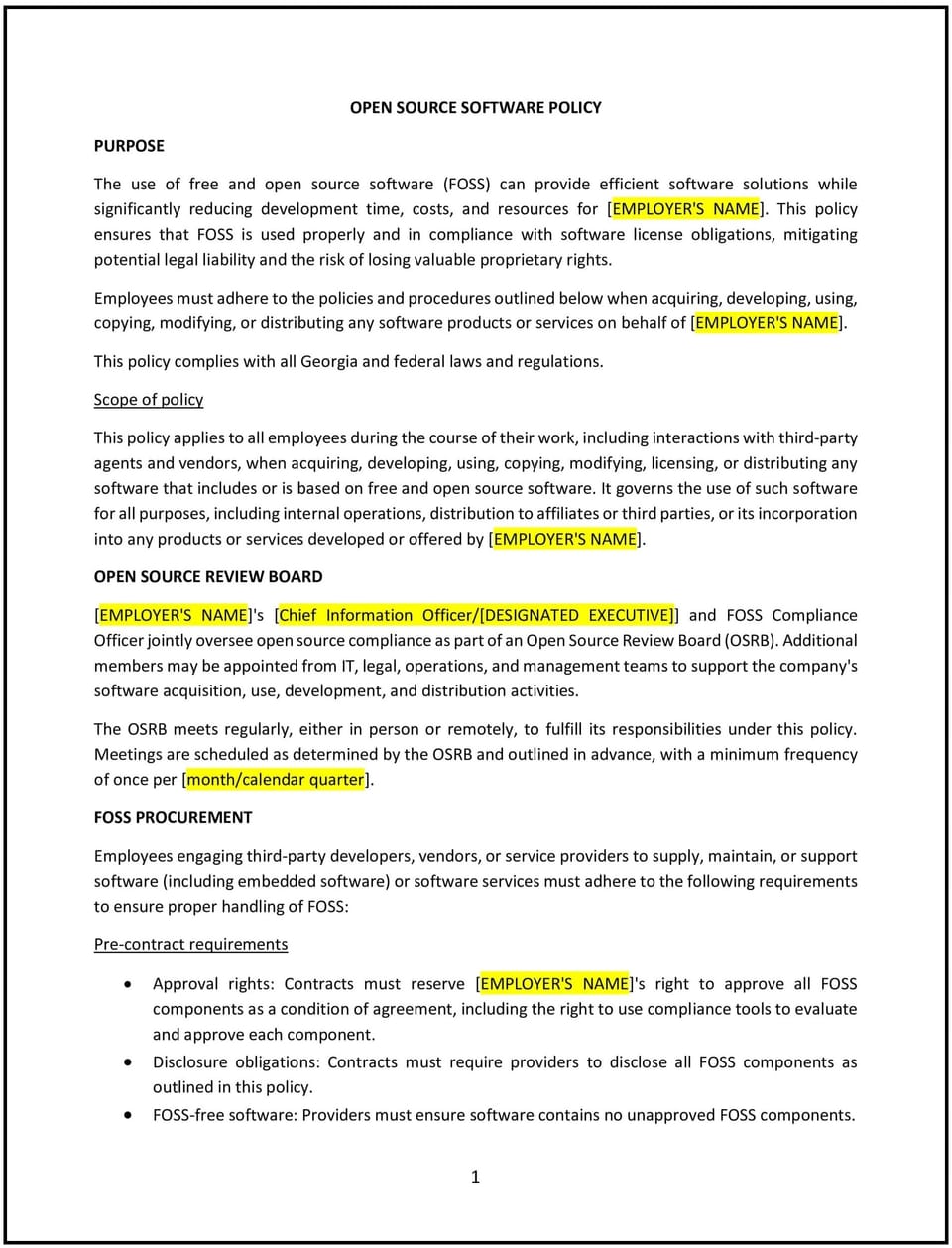Open source software policy (Georgia): Free template

Open source software policy (Georgia)
This open source software (OSS) policy is designed to help Georgia businesses manage the use, distribution, and development of open source software. The policy outlines guidelines for responsible OSS usage, compliance with licensing requirements, and risk management to safeguard intellectual property and operational integrity.
By implementing this policy, businesses can leverage the benefits of open source software while minimizing potential legal and security risks.
How to use this open source software policy (Georgia)
- Define open source usage: Clearly outline acceptable uses of OSS, such as for internal development, testing, or production purposes.
- Establish approval procedures: Require employees to obtain approval from IT or legal teams before integrating OSS into business systems or projects.
- Review licensing requirements: Ensure employees understand and comply with the licensing terms of any OSS used, such as attribution or distribution obligations.
- Address modification and distribution: Provide guidelines for modifying OSS or sharing modified versions, including compliance with license terms.
- Include security protocols: Require OSS to be reviewed for vulnerabilities or malware before being integrated into business systems.
- Monitor third-party dependencies: Track and manage dependencies in OSS projects to mitigate risks associated with outdated or unsupported components.
- Provide training: Educate employees on the benefits, risks, and responsibilities of using OSS in their roles.
- Review and update regularly: Periodically assess the policy to reflect changes in Georgia business practices, OSS trends, or regulatory requirements.
Benefits of using this open source software policy (Georgia)
Implementing this policy provides several advantages for Georgia businesses:
- Enhances innovation: Encourages the use of OSS to accelerate development and reduce costs.
- Reduces legal risks: Clear guidelines help businesses manage licensing obligations and avoid intellectual property disputes.
- Improves security: Risk assessments and monitoring mitigate vulnerabilities associated with OSS usage.
- Promotes consistency: Standardized practices ensure OSS is used responsibly and aligns with business goals.
- Reflects Georgia-specific practices: Tailoring the policy to local industry needs ensures its relevance and practicality.
Tips for using this open source software policy (Georgia)
- Track OSS usage: Maintain an inventory of all OSS used in the organization to ensure proper management.
- Engage legal counsel: Consult with legal experts to navigate complex licensing requirements and obligations.
- Regularly update OSS: Apply updates and patches promptly to mitigate security risks and maintain system reliability.
- Encourage transparency: Foster a culture of openness around OSS usage to promote collaboration and accountability.
- Evaluate alternatives: Assess whether OSS is the best solution for specific projects or if proprietary software may offer advantages.
Q: What is considered open source software under this policy?
A: OSS refers to software with source code made available under licenses that allow use, modification, and distribution.
Q: Are employees allowed to modify OSS for business use?
A: Yes, employees may modify OSS, but they should ensure compliance with licensing terms and seek approval if required.
Q: How can businesses ensure OSS is secure before use?
A: Businesses should conduct security assessments, including scanning for vulnerabilities and reviewing the software’s update history.
Q: What should businesses do if an OSS license requires attribution?
A: Businesses should include proper attribution in documentation or product materials, as specified by the license.
Q: Can employees contribute to OSS projects on behalf of the business?
A: Yes, but contributions should be approved by management and align with the business’s goals and intellectual property considerations.
Q: How should businesses handle outdated OSS components?
A: Businesses should replace or update outdated components to maintain security and compatibility with current systems.
Q: How often should this policy be reviewed?
A: The policy should be reviewed annually or as needed to reflect changes in OSS trends, Georgia business practices, or licensing regulations.
This article contains general legal information and does not contain legal advice. Cobrief is not a law firm or a substitute for an attorney or law firm. The law is complex and changes often. For legal advice, please ask a lawyer.


